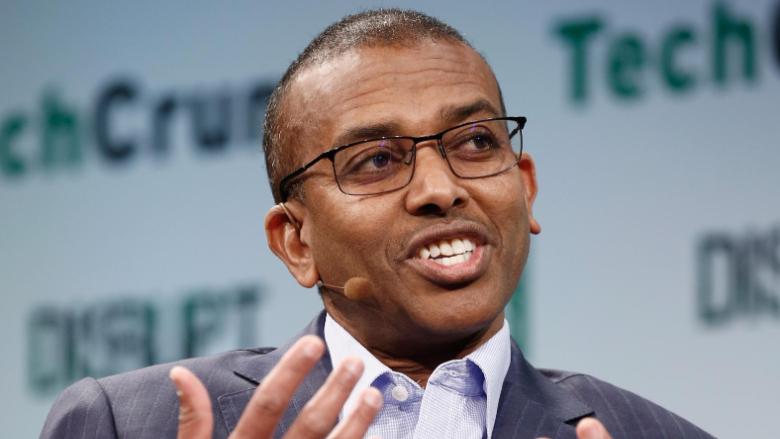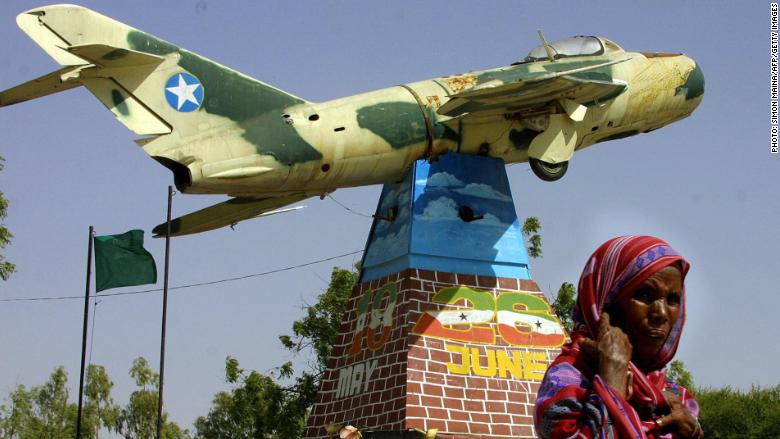
Former refugee Ismail Ahmed knows how difficult it can be to send money home — so he started a company to make it simpler.
The business he founded, WorldRemit, has 600 employees and handles 1.1 million payments per month. It aims to have 10 million people using it regularly by 2020.
The roots of the company can be traced to 1988, when war broke out in Somalia and Ahmed was smuggled out of the country in a dump truck. His hometown of Hargeisa was badly damaged in the fighting.
"The guy who helped me took a big risk ... I acted as a worker helping him, while he hid my passport in the truck," said Ahmed. "I had no communication with my family ... [they] thought I was killed."
It took Ahmed over a month to reach his final destination in the United Kingdom. Once there, he took on jobs to support family members who had fled to a refugee camp in Ethiopia.
The importance of sending money home
Sending money home was second nature. Ahmed remembered how important remittances were for his family in his youth, when relatives working in the Middle East would send their earnings to Hargeisa.
"It was like a gold rush for us," he recalled. "Whether you were a clerk, or a construction worker, if you crossed the Red Sea, you could make a lot of money."

Related: CEOs call out Trump's 'heartless, cruel' border policy
The transactions were costly to make and took months to complete, but Ahmed's family relied on them for a third of their income. The impact of the foreign cash was visible in Hargeisa, where people used it to buy properties and start businesses.
"Remittances really transformed our hometown when I was growing up," he said. "After the war ... the remittances from refugees helped rebuild the economy."
Related: How this Syrian refugee became a tech mentor
Seeing the problem up close
Ahmed discovered how frustrating the remittance process could be during his student years in the United Kingdom, when he tried to send home money he earned picking strawberries during the summer.
The nearest place he could make a transaction took two and half hours to reach by train.
"The cost of getting there was quite prohibitive for me ... that's when I thought there must be a better way to do this," he said.
Ahmed studied remittances before going to work for the World Bank and the United Nations Development Program.
While working at the UN, Ahmed blew the whistle on alleged corruption and suffered what the organization later acknowledged was "retaliation."
The episode initially felt like a setback, but it would lay the groundwork for WorldRemit. After receiving $200,000 from the UN in 2010 as compensation for unfair treatment, Ahmed used it to set up the company the same year.
Starting up
WorldRemit has since secured over $220 million in funding from investors including Accel Partners, TriplePoint Venture Growth and Silicon Valley Bank. WorldRemit and Ahmed are based in Britain.
Ahmed said his experience as a refugee helped him understand what customers need, and how to build a company that delivers. One of his top priorities is a diverse workforce.
"Lot of migrants are similar ... a lot of our customers went through the same challenges," he said.
Related: A former refugee, she's now the first Latina CEO of a major US company
WorldRemit fees range from 2% to 3%, less than most major banks would charge for similar transactions.
The company undercuts banks by allowing users to pay into a local WorldRemit bank account. Funds are then paid out from a WorldRemit account in a second country of the user's choice. No money actually crosses borders.
It competes with traditional money transfer companies including Western Union, as well as digital upstarts such as Transferwise.
WorldRemit offers recipients the chance to pick up their cash at a network of supermarkets and retail chains.
"Speed is critical for many of our customers — apart from the amount they send every month, they might need to do urgent transactions," said Ahmed.
WorldRemit has made inroads in the United States, and it's now licensed in all 50 states. New York has quickly become its biggest sending market, overtaking the United Kingdom.

